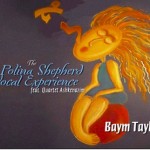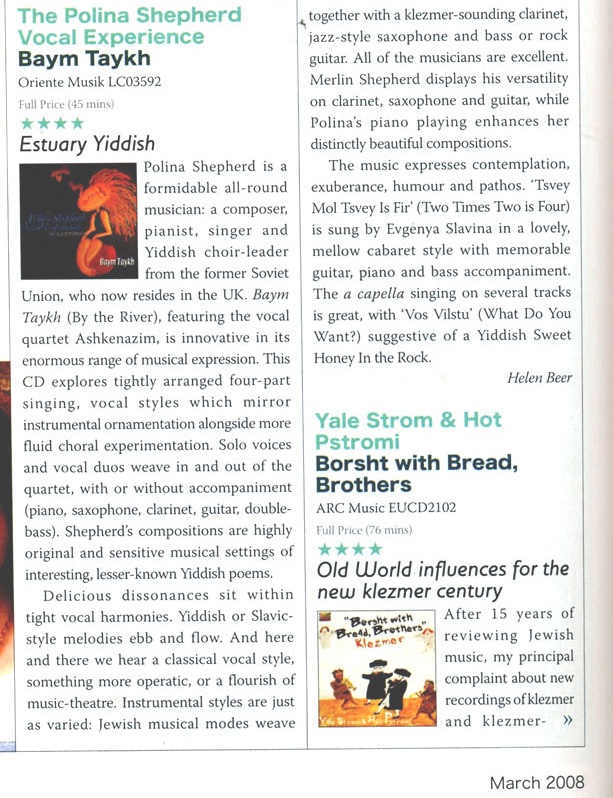 Buy digital copy for £7.99
Buy digital copy for £7.99
The latest programme and recording from the Polina Shepherd Vocal Experience featuring the Quartet Ashkenazim shows two changes in personnel plus some new instrumentation. The new baritone singer, Merlin Shepherd offers a strong and folky voice, passionate and sensitive. The new alto, Evgenia Slavina, also with a strong folk element to her voice offers a great depth, strength and thoughtfulness. With Polina Shepherd and Yana Ovrutskaya as the longest standing members of the quartet, the sound is warm, robust and yet still fresh and sweet.
New instrumentation comes as piano, clarinet, tenor sax, electric guitar and double bass. The tunes and arrangements themselves show a maturity and development of Polina’s style. From the opening track, the ubiquitous Ai–yai–yai with its raunchy soloing and greatly entertaining ending to the simple and delicate shpitsn berg, sung a capella, a delicious nugget of sweet sound. This remarkable recording captures even more of the passion, pain, joy and bittersweet world of yiddishkeit than she achieved previously, and now even with electric guitar bringing the sound of this terrific ensemble bang up to date. Polina’s composing, arranging and overall musicality have taken a daring step into previously unchartered waters. Indeed, the quartet really now finds itself “on the other side of the river”!
 Linernotes
Linernotes
In this CD’s eponymous song “Baym taykh” we witness a young girl from the opposite side of the river and her experience over the course of a few hours. We remain separate from her by our vantage point, always observing, never quite involved. Reading the poem, we may experience a two–fold effect. One is of distancing, of making us separate, different, other. The second more elusive effect is of recognition, realising that our destiny and her’s are involved and quite possibly the same. At least that is what could be projected onto the poet’s words.
Mani Leyb crafts a world (like so many great poets) where we have little choice but to look within in order to see without. Her loss of glik (luck) might be our loss too. And yet we, unlike she, have the choice, the option to choose our own destiny. From this place we can choose to take responsibility for our world, for our actions, for our thoughts. Or we can pass the responsibility onto our surroundings. She decides right there, that she will have no luck, although we can see that she has actually chosen this path, possibly from fear of failure, from her insecurity. And our choice to feel sadness from this might also be linked to OUR insecurity, OUR fear of failure. Perhaps it is better to learn from the experience of childhood that all can be a blank page, and by not asking the flowers to return we can guarantee that they might.
At what point in our childhood do we become aware of ourselves as separate, different? And as we grow, how do we deal with the newness of otherness? Who tells us that we are. And at what point do we become aware of Death? Surely the development of consciousness in a child’s growth can be defined by these two rubicons. And do we carry these moments of no return with us all our adult lives? In our poems, in our dreams, in our song, in our every breath? Surely the defining moments of our existence, our rubicon, our step from the innocence of childhood into the consciousness of adulthood are moments that define everything that we do.
On the other side of the river the Sun is going down. To be a little trite, that also means that further West, the Sun is rising. And that is another turning point. The rubicons we encounter on our journey into adulthood take hold of all of our beings and yet, our worlds, and our thoughts will always appear on the other side of someone else’s river.
This CD, the Quartet Ashkenazim’s fourth recording contains all original compositions with 11 poems by Yiddish writers, two from folklore and one wordless. The diversity of musical expression far surpassing all their previous works. Drawing from a large variety of Poets and a great variety of subjects Polina Shepherd creates a world where all is other and yet all is strangely familiar.
Baym Taykh CD
Total time: 45:25
- Ai–yai–yai 5:44
- Shpitsn berg Lyrics: Osher Shvartsman 1:48
- A frisher vint Lyrics: David Hofshtein 3:00
- 2×2=4 Lyrics: H. Leivick 3:15
- Nit ikh veyn un nit ikh lakh Lyrics: Shike Driz 2:36
- Der heyliker Balshemtov Lyrics: Zisha Landau 4:47
- Tsvey Lyrics: Moyshe Kulbak 2:09
- Tirtl–toybn Lyrics: Abraham Sutzkever 1:02
- Lernendik geyen Lyrics: Yitskhok Leybush Peretz 0:59
- Dertseyl Lyrics: Moyshe–Leyb Halpern 4:42
- Oy, a shuster darf ikh nisht trad. 3:11
- A nigndl Lyrics: Shike Driz 3:01
- Vos vilstu trad. 3:23
- Baym Taykh Lyrics: Mani Leyb 5:16